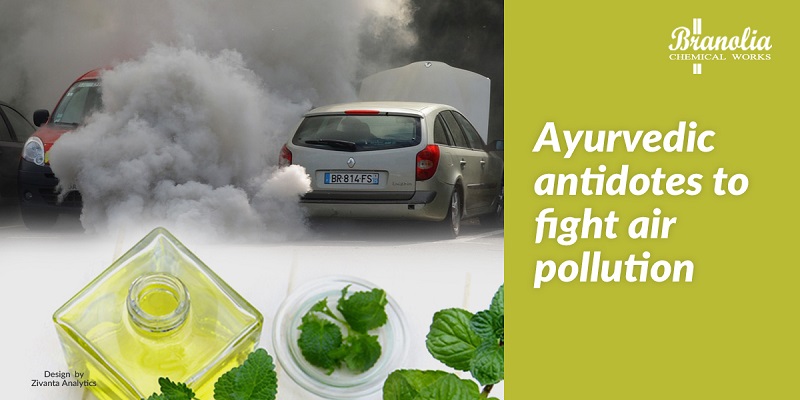
Bleak evenings, making our hair stand on its edge. Abrupt Celsius dips. Frequent inclement weather conditions, all of these conditions hint towards the approaching seasonal transition. As winter begins to set in its foot, its somber strokes make us drowsy and feel listless. The seasonal transition in India has brought along with it, a thick layer of air encompassing us, obstructing and make things go haywire. Smog (Smoke Fog) overhangs a substantial portion of the Northern belt of India, bringing Delhi and the adjacent states of Haryana and Punjab within its grip. WHO’s World Global Ambient Air Quality Database1 states that nine out of ten people inhaled polluted air, and more than 80% of the people dwelling in the urban areas are subjected to outdoor pollution. This percentage surpasses optimum health standards. People are more keen to resort to Ayurveda’s traditional techniques to shield themselves against the hazardous impacts of air pollution.
Neem
The leaves of this tree work wonders for the body. It is a renowned blood purifier. It also has an exceptional tenacity to endure high pollutants. Neem trees act as natural air filters, straining dust particles from the air and also neutralizing the effect of harmful emissions. Doctors more often advise washing off the dirt from the face or hair with a neem solution, prepared by boiling neem leaves in water. Neem solution proves to be useful for rejuvenating our skin after a grueling day.
A Combination of Tulsi and Giloy
Tulsi or (basil) has always emerged as an essential constituent of many an Ayurvedic formulation. Apart from having a religious significance, it is a magnificent herb used for purifying air on account of its anti-inflammatory and anti-bacterial compounds which neutralize the gaseous contents of air. It enhances the immunity power of the body against common cough and cold. Branolia Chemical Works manufactures two products, Branolia’s Honey Guard & Bitocough, which are concocted with the extracts of Tulsi and primarily focus on treating the common cold.
Amla (Amlaki)
Better known as the Indian gooseberry, it has a high concentration of vitamin C, an antioxidant that resists the body against poisonous gases. The consumption of Amla fortifies our immune system. It replenishes the Vitamin E in our blood. The quality of air deteriorates day by day posing a threat to our body’s immune system. Thus, we can envision that the consumption of Amla tends to be a solution to most of our health problems. Amla, when combined with Haritaki and Bibhitaki is known as Triphala, which is one of the major ingredients of Livonia, a well-known product of Branolia Chemical Works.
Turmeric (Haldi)
Haldi is another herbal entity known for its antiseptic property and has a broad range of use. The anti-oxidant properties of turmeric help in resisting the body against problems caused by the inhalation of gaseous pollutants. The anti-inflammation properties naturally bestowed upon it protects the lungs from infections and other respiratory problems.
Pipul
A traditional herb that is used in many of the Ayurvedic formulations. Pipul, when mixed with honey, cleans the lungs of its impurities reviving its healthy functioning. Bitocough, a formulation of Branolia Chemical Works effectively treats bronchial problems. Bitocough’s exclusive composition of Pipul, Vasak, Tulsi, and Jashtimadhu are potential cures of cough and sore throat.
Ghee
Ghee is a specific form of clarified butter. It is one of the dairy products obtained from cow’s milk and is more often used in Indian households for cooking. The inhalation of gaseous pollutants can be blocked by applying greasy substances like ghee around the rim of the nostrils. The passage of micro particles of dust or harmful substances will be obstructed on the verge of entering our nasal cavity. A remarkable external shield provided by ghee.
The horrid impacts of pollution have infiltrated our daily lives and have already ceased the momentum of our reflexes. However, we, as the inhabitants of this planet can do our bit by going the traditional way, which is curbing the disastrous impacts of air pollution by resorting to Ayurvedic solutions. Branolia Chemical Works, with its wide range of products, stands by us in this endeavour.
Reference:
Article on World Global Ambient Air Quality Database1
https://www.vox.com/2018/5/8/17316978/india-pollution-levels-air-delhi-health



